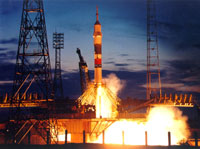Russian space industry becomes top newsmaker
At certain periods of a year different sectors of the military-industrial complex account for different parts of the news reels. The beginning of this year is definitely dominated by the news from the space industry. A lot of new hardware is being built for different projects, both in the orbit and on the ground.

According to the general designer of corporation Energiya Nikolay Sevastyanov there are seven piloted spacecraft Soyuz and 12-14 cargo Progress at different stages of manufacture. The construction period for one is about two years. Moreover, Energiya is about to increase the production rate, as from 2009 Russia is to double the number of launchings. Nearly simultaneously the general director of NPO PM Nikolay Testoedov informed that in 2007 Russia will launch 12 spacecraft developed by NPO PM, of which 6 in the interests if the Russian global positioning system GLONASS. An interesting new shade to the Russian analogy of GPS came from this source. In particular, it was stated that the designers of GLONASS satellites of the following generation took into consideration the experience of jamming such systems during recent regional conflicts. Special coding equipment will be installed on the ground equipment and on the satellites next to GLONASS-K series.
Meanwhile Russian Space Agency Roscosmos announced that in 2007 the state budget will allocate about 10 billion rubles for the development of GLONASS. According to the deputy head of the Agency Yuri Nosenko there will be additional funding from other sources, totally about several hundreds million rubles. Non-budget means will be used on developing ground infrastructure. GLONASS was the focus of attention at the International Forum on Satellite Navigation that took place in Moscow on April, 9-10. Before the end of this year the orbital grouping of GLOMASS satellites will consist of 18 on-duty units. Full fledged global system requires 24 satellites promised by the Russian government before 2009. However, nearly immediately after these plans were announced Russian technical experts appealed to the official structures not to limit the numbers of satellites, because more satellites are needed for perfecting the quality of the service with no limitations regarding the terrain properties and locations around the globe. They insist on 27-30 satellites. It proves the GLONASS is really viewed for global marketing. This year it will cover the territory of the Russian Federation.
Apart from purely military sphere there are a number of sectors where GLONASS is badly needed. In 2006 Roscosmos successfully finished tests of the principally new and safer control system for the orbit grouping. GLONASS allows for increasing the accuracy of measuring the rockets’ trajectories times fold. In the long term this technology will allow to refuse from an expensive ground infrastructure. Nearly simultaneously with the Forum the First Vice-Premier Sergey Ivanov supported the idea of equipping transport vehicles with GLONASS receivers. More over, it could be done even obligatory as part of the national system of fighting smuggling.
Yuri Seleznyov
Pravda.ru
Subscribe to Pravda.Ru Telegram channel, Facebook, RSS!


